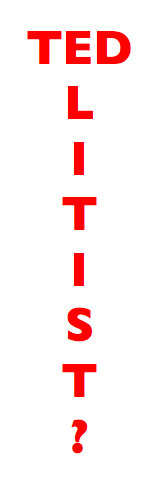The Tyranny of TED
 The Tyranny of TED? If you read my blog you’ll know that I’m a fan of short presentation formats like Pecha Kucha (20 slides x 20 seconds) and Ignite (20 slides x 15 seconds), and I have no fundamental objection to the longer, eighteen-minute free-form TED format.
The Tyranny of TED? If you read my blog you’ll know that I’m a fan of short presentation formats like Pecha Kucha (20 slides x 20 seconds) and Ignite (20 slides x 15 seconds), and I have no fundamental objection to the longer, eighteen-minute free-form TED format.
But there’s something about TED that I don’t like.
TED is elitist.
TED’s marketing: “The annual TED conferences, in Long Beach/Palm Springs and Edinburgh, bring together the world’s most fascinating thinkers and doers”. TED hand-picks attendees. Attending TED is very expensive: currently $6,250 per year for TED Conference and $6,000 per year for TEDGlobal. TED promotes the elite audience as a plus. Presenters must spend significant time creating a highly scripted presentation that touches the audience profoundly, ideally in some novel way.
There’s a page on TED’s website that attempts to address these issues. It defends the exorbitant cost of attending TED live events. How? By claiming that the majority of attendees are very successful and that their success has enabled them to pay these fees. The private nonprofit Sapling Foundation owns TED. The foundation’s 2015 990-PF tax return states that the foundation had assets of $53 million, revenues of $65 million, and paid its top six employees over $2 million in compensation. TED states that they give scholarships to some people. But the 990 shows no details on the level of financial support provided. The website is silent as to the method of selecting scholarship recipients.
It doesn’t have to be this way
I believe that the majority of people have something worthwhile to say about some topic. What they have to say is of interest to their peers. The Pecha Kucha events I’ve run have been filled with presenters who responded to an open request. The resulting sessions have been interesting, entertaining, and fulfilling to their audiences. TED perpetuates the myth that only a minority in this world have something worth saying. The organization derives revenue from appointing itself as the gatekeeper of who should be up on the stage and creating an exclusive event that can be capitalized. TED is welcome to take this approach, of course, and entitled to its success.
Don’t believe that the presenters of TED are the only people who should be presenting in this way. This is the tyranny of TED. Such a belief perpetuates the old hierarchical model of learning: a minority of people know and a majority don’t. The reality of the importance of social learning in today’s world, learning where a teacher at one moment becomes a student the next, is weakened by an organization that succeeds in the marketplace by selecting and glorifying a few to the exclusion of the rest of us.
